
views
Saying Goodbye

Be supportive of the move. Even if it's difficult, make an effort to be supportive of your friend's move. As hard as the move is on you, the stress is likely worse for your friend. He or she has to cope with the stress of packing and planning, not to mention the stress involved with moving to a new community. You want to make sure you're supportive of your friend right up until he or she moves away. This can help you end things on a good note. Listen if your friend needs to talk. He or she may feel stressed, sad, or otherwise upset about the coming move. Be a good friend and offer a listening ear. Allow your friend to vent his or her frustrations to you. While it's okay to tell your friend you're going to miss him or her, avoid stressing your friend out further. Even if you're sad your friend is moving, try to express genuine happiness for him or her. Wish your friend good luck on his or her big move. Like anything he or she posts on Facebook regarding the move. Try to help your friend get excited. Look up new things for your friend to do in his or her new home.

Create memories you can record. Memories are important to help you cope with a friend's move. You may feel less sad about your friend leaving if you have tangible memories on hand. Try to take some pictures, videos, and voice recordings of you and your friend. This can help the two of you say goodbye. You'll feel less sad about your friend's absence if you know you have something to remember him or her by.

Seek out support from others. As stated, your friend is probably already overwhelmed with his or her move. You do not want to dump your sadness on your friend. Seek out support from other friends and family members. Talk to them about how you're feeling about saying goodbye to your friend. Ask someone if you can talk to them first, explaining you need to sort out your feelings about your friend's coming move. Ask them if they can simply listen to you talk for a bit, and then let them know how you're feeling. Choose someone who's empathetic, like a kind older relative or close mutual friend. Select someone who's listened to you in the past when you've been going through difficult times.
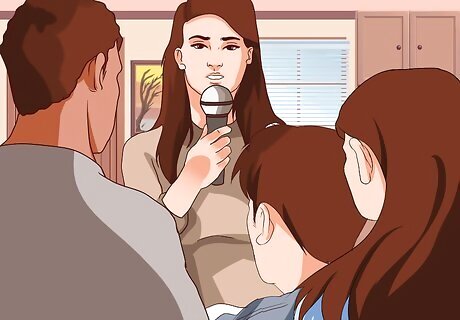
Consider hosting a goodbye party. A goodbye party can be a great way to mark the end of an era. Ask your mutual friends if they'd consider getting together to say goodbye to the friend who's moving. This will give your friend a chance to talk to everyone one last time. Make sure you ask your parents before hosting a goodbye party. Consider planning some party events that help promote closure. For example, you could all give a brief speech saying goodbye. You could also all sign a goodbye card for your friend. Do not expect a goodbye party to be all fun and games. You should expect there will be some tears and sadness as well. This is normal. Do not try to force your friend or your guests to only experience feelings of happiness.

Try a goodbye gift. Consider giving your friend a goodbye gift. This can help both of you feel some closure. Your friend will have something to remember you by, and you'll feel like you're getting a chance to say goodbye in an official way. You do not have to spend a lot of money on a goodbye gift. It can be something sentimental that reflects your relationship. For example, if you and your friend loved a particular coffee shop, buy him or her a cheap mug from that shop. You can also make a creative gift for your friend. Write him or her a poem commemorating your friendship. Make a collage of photos of the two of you.
Coping with Your Friend's Absence

Recognize negative feelings are normal. When your friend moves, you should recognize that negative feelings are normal. They show that you built a great relationship with a meaningful person. You should not expect to bounce back from the transition quickly. It's okay to allow yourself to feel what you are feeling, whether it's good or bad. It's normal to feel sad when a friend is gone, especially if you were particularly close. While you'll still stay in touch, you can't simply go over to your friend's house at the end of a long day anymore. It's normal to feel disappointed and frustrated with this transition. You also may feel some anxiety. Your friend is going to meet new people in his or her new location. You may worry about being replaced or forgotten. Such anxieties are also very normal. If your friend moved away for positive reasons, such as a new job or getting into a great college, you may feel guilty for feeling sad. You may feel as if you should be happy for your friend and his or her great new life. However, it's okay to feel sad. Any transition is bound to result in mixed emotions. You can be happy for your friend, but still feel sad as you'll miss him or her.
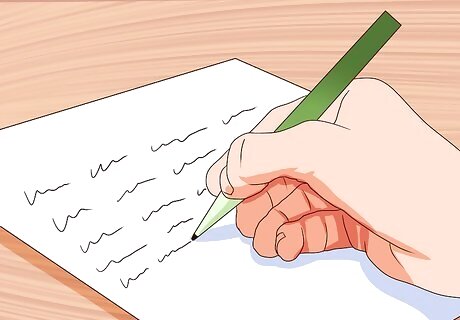
Get your feelings out. Bottling up your feelings during a rough transition is a bad idea. You need to be able to express your feelings in order to work through them. As we've already discussed, you can talk to a trusted friend or family member. You can also express your feelings in writing. Journaling about your emotions a few times a week can help you process the transition.

Reflect on the friendship. Take some time to reflect after your friend moves. Moving can create a strange feeling. The friendship is not over, but it has changed dramatically. Things will not be the same from here on out. Take some time to reflect on your friendship when you were living in the same place. Try to see both the positive and negatives. You will have some regrets when a friend moves. There's probably a lot the two of you never got a chance to do together, for example. However, you should also be grateful for the time you did have.

Give yourself time to adjust. Sometimes, adjustment simply takes time. When a close friend moves away, you may feel odd in his or her absence. You may be unsure of what to do with yourself on weekends, for example, or feel lost when you don't know who to drop in on after a stressful day. This is all normal. Do not try to force yourself to feel better quicker than what feels natural. Allow yourself the necessary time to adjust to a friend's absence.

Keep busy. If may take a while to adjust to the absence of a good friend. Find ways to keep yourself busy in your friend's absence. Spend time with other friends or family members. Seek out new hobbies or activities that will occupy your time. If you had a certain day of the week you typically spent with your friend, find ways to fill your time on that day. For example, maybe you always had dinner with your friend on a Friday night. Make regular plans with another friend on that night or join a club that meets on Fridays. Reach out to other friends. While you may miss your friend who moved away, you should work on strengthening your relationships with your friends who still live near you. These friends are probably missing the friend who moved away as well, and will appreciate you wanting to reach out. Find new hobbies. If you're unsure what to do with yourself in your friend's absence, finding new ways to pass the time can help. Explore your interests. If you've always been interested in cooking, for example, try enrolling in a cooking class.
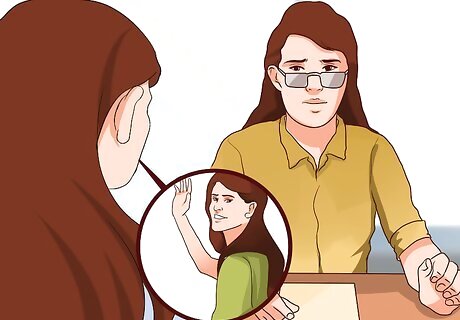
See a therapist, if necessary. It's normal to feel sad when a friend moves away. However, certain mental health conditions, like clinical depression, can make adjusting to change more difficult. If you have been previously diagnosed with a mental health condition, or if you suspect you may be struggling with a condition like depression, seek the assistance of a therapist. You can find a therapist by asking your regular doctor for a referral. You can also find a therapist through your insurance provider. If you are a college student, you may be entitled to free counseling through your college or university.
Staying in Touch

E-mail or text your friend frequently. While your friend has moved, be grateful for modern technology. It's easier than ever to stay in touch with e-mail and text, both of which send messages instantaneously. Try to keep up regular correspondence via e-mail. Send your friend an e-mail every couple of weeks, updating him or her on how you're doing. You can also text your friend every day, just making small observations and asking how your friend is doing.
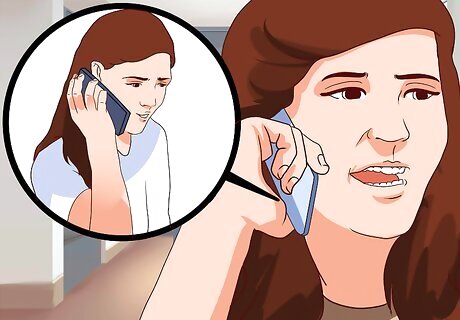
Call your friend or try a video call. Random, long conversations do not have to end simply because a friend moved. Even if your friend is thousands of miles away, you can call or video chat regularly. Try to schedule regular Skype, Facetime, or Google hangout sessions. You can also simply call your friend on the phone. Agree, for example, to call or video chat every other Tuesday.

Stay in touch on social media. Social media makes it very easy to stay in touch with friends who have moved. Take advantage of things like Facebook, Snapchat, Instagram, and Twitter. You can get updates about your friends day-to-day activities via social media outlets, making you feel like the distance is not insurmountable. You can also play games from a distance via outlets like Facebook and your smart phone. Trivia games, and games like Words With Friends, can make you feel like your friend is right there with you hanging out.
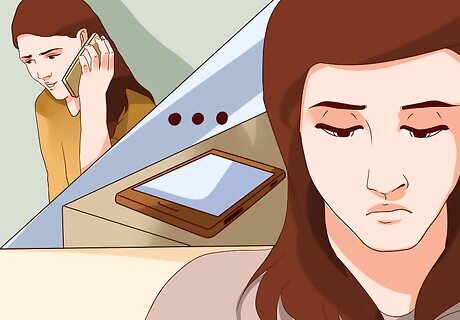
Accept contact will lessen with time. While it's easy to stay in touch with a long distance friend, you will still probably communicate less than you did when you were living in the same place. At first, you may call or text constantly as you'll be missing each other a lot. However, as you both adjust and meet new people, communication may become more infrequent. This is not necessarily a bad thing and it does not have to mean the two of your are growing apart. Many people have long distance friends who they feel very close with, even if they only communicate on occasion. You may find that, when you and your friend do talk, you feel like no time has passed at all, even if it's been months.

Get together when you can. Even if your friend has moved away, you may still be able to see each other on occasion. Try to get together once a year, or every other year. If your friend still has relatives living in your area, he or she may be around over holidays. While visits may be somewhat infrequent, you may find you value your friend's presence more when you two only see each other once a year.



















Comments
0 comment